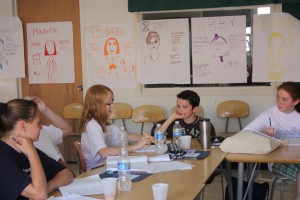Campers Kindle Creative Fires with Pens and Pages
 TOPSHAM — Ten-year-old Abby Malbon of Topsham sits with her back to the wall, knees together supporting the notebook she is writing in, gripping the pencil with the painted pink fingertips of one hand while steadying the pages with her other hand.
TOPSHAM — Ten-year-old Abby Malbon of Topsham sits with her back to the wall, knees together supporting the notebook she is writing in, gripping the pencil with the painted pink fingertips of one hand while steadying the pages with her other hand.
Malbon, who will enter fifth grade next school year, said this is the second year she’s come to the Young Author’s Camp, presented by the Maine Writing Project, at Woodside Elementary School.
This week, the best skill she’s learned, according to Malbon, is alternative ways to introduce dialogue, so instead of repeatedly saying “said,” her characters can “whisper” or “billow” their words.
Michele Aronson is a third grade teacher at Woodside and a teaching consultant for the Maine Writing Project. “We are an affiliate with the National Writing Project,” for which 200 national project sites around the country exist, Aronson said.
The National Writing Project organization has been around since 1973, working to improve the teaching of writing and focusing on professional development for teachers.
The Maine Writing Project has two sites, one at the University of Southern Maine — with which this camp is affiliated — and one at the University of Maine in Orono. Aronson has been a teaching consultant for four years and has worked at the Topsham, Brunswick and Bar Harbor sites.
“Over the last few years, we’ve had between 20 and 25 campers. Our typical camper — they range coming into grades three through 12 — and they are mostly students who love to write, and this is their opportunity to be creative,” Aronson said Thursday morning, as a batch of enthusiastic writers neared the final chapter of this week’s camp. “They have a choice of genres — fiction and nonfiction. They write a learning autobiography. They’re able to get support from teacher consultants,” with the National Writing Project.
“We also have students who aren’t the best writers, but their parents have encouraged them to join the camp to see if they can find a creative outlet,” Aronson continued. “They know they have to do some writing in school, it’s how we communicate. So to sort of encourage them, it’s different than school writing. It’s not graded. They are published at the end,” in an anthology, which further engages the students.
The teacher consultants, Aronson explained, use a lot of pre-writing and launching strategies, such as writing about pictures from magazines and word-a-minute exercises; sharing, team building and trust exercises; and skit acting to develop story elements.
The kids don’t have to be the best writers, she says, just creative. For those who aren’t naturally gifted writers, the biggest growth teachers observe is the boost in confidence.
“That’s a big part of writing,” Aronson said. “It’s taking a risk: You’re sharing your thoughts and you don’t want to be judged for that. So we create a really safe environment where you are encouraged to take risks.”
There also are a number of boys in the camp, Aronson said, “and we know from research that literacy is tough for boys — both reading and writing — and because they are given the option, they can write anything. They can write cartoon strips, they can write fiction, they can write graphic novels … They’re allowed to bounce ideas off from each other creatively, and we see them especially really branching out and enjoying camp by the end of the week.”
Last summer was the first time the camp took place at Woodside. When Malbon heard some of her friends were attending the writing camp, she and her sister decided to try it as well.
Back for a second round, Malbon on Thursday morning showed a reporter the chapter book she’s been working on since last September. The work-in-progress is titled “Two Wolves’ Quest.”
This week, the best skill she’s learned, according to Malbon, is alternative ways to introduce dialogue, so instead of repeatedly saying “said,” her characters can “whisper” or “billow” their words.
“The story is about: These two wolves were on a hunting trip, and they were hunting and they saw some cows, and they went to go get some. A farmer shot and they all scattered, and they were all starving when a blizzard hit because they didn’t get the food, and Autumn and Jack got lost in the storm.”
The two wandering wolves started making friends with other wolves and forming a new pack, Malbon said. “And it’s called ‘Two Wolves’ Quest’ because their quest is to find their old pack.”
With another book in the series planned, Malbon said that when she reaches adulthood, “I think and I’m hoping I can be an author and publish books,” in addition to landing a job as a clothing designer in the fashion industry.
Allison Bouchard, 16, and Caitlin Smith, 17 — are past campers who have volunteered to serve as mentors this week.
Bouchard loves seeing the kids with their composition books and pencils rather than just computers at camp. The students also know a lot about punctuation and dialogue.
Smith adds, “These kids are brilliant with everything they do. … They have such an enormous imagination. There’s just so much in there, and they can use this camp to get it all out; anything that they want to get out, they get out. It’s amazing. I miss being young and having all of these thoughts that they have.”
Reprinted from The Times Record, Mid-coast, Maine
